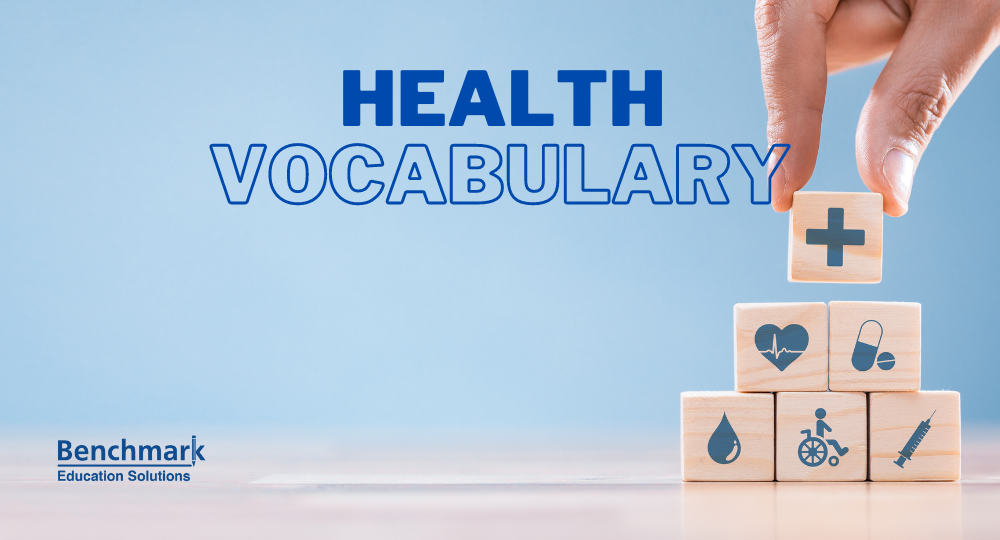

Health, fitness, and lifestyle are extremely common subjects on the IELTS speaking and writing tests, so you must have a good grasp of some of the most commonly used health and fitness-related vocabulary words. This article contains some essential IELTS vocabulary and idioms for you to use for the IELTS speaking and writing sections.
Table of Contents
1. Vocabulary for Health & Lifestyle
Here is a list of common IELTS verbs and nouns related to health and lifestyle. Then, there are some example IELTS speaking questions for you to see the words in context, followed by an exercise for you to practice with the words.
- Addictive – Substances and activities that create either a physical or mental dependency
- Administer medicine – To give medicine to a patient
- Alleviate – To relieve pain or symptoms
- Chronic – A long-lasting and difficult to eradicate illness
- Deteriorate – To become worse
- Diagnose – To identify the nature of a medical condition
- Disease – A disorder of structure or function in a human, which produces symptoms.
- Disorder – An illness or condition that affects mental or physical function
- Epidemic – A large outbreak of a disease or virus
- Exercise – Physical activity to assist the body in staying fit and healthy
- Fatty foods – Foods that are high in fat and lead to health problems
- Healthy diet – Consuming food that is beneficial for the body
- Impair – To weaken or damage
- Infection – The invasion and growth of germs in the body
- Injury – Physical harm or damage
- Keeping fit – Doing exercise to stay healthy
- Active lifestyle – A life that involves lots of exercise and activity
- Mental health – Emotional and psychological well-being
- Nutrients – Vitamins and minerals found in foods and plants
- Obesity – A condition that results in abnormal or excessive fat accumulation
- Premature death – Death occurring before the average age of death
- Preventative medicine/treatment – Designed to prevent health problems rather than resolve them
- Public health services – Services provided by governments, usually free of charge
- Rampant – Happening a lot or becoming worse
- Rehabilitation – Restoring someone to health after addiction or sickness
- Sedentary – inactive and without physical exercise
- Sugary foods – Foods that are high in sugar, such as chocolate and carbonated drinks
- Unhealthy diet – Consumption of fatty and sugary food and drinks, likely to lead to health problems
2. Sample Speaking Answers
IELTS Speaking Questions
Here are some sample questions from the IELTS exam and some sample answers with some of the vocabulary words in context.
1. What do you think is more important, eating healthy or doing exercise?
I believe that exercise is more important because it has been shown that even with a healthy diet, a sedentary lifestyle can lead to mental health problems. A very active person can get away with eating an unhealthy diet because they burn more calories whilst exercising.
2. What are the health benefits of playing a sport?
There are several health benefits to partaking in sports and avoiding a sedentary lifestyle. First, it helps people keep fit, which, in turn, reduces the chance of obesity, mental illness, disease, and premature death.
3. Is it easy to stay healthy in the area where you live?
Yes, I think that it is easy to stay healthy in my area because there are lots of opportunities to lead anactive lifestyle by doing exercise in the recreational spacesclose to where I live. Also, I shop in the local market which allows me to eat a healthy diet of fresh produce and avoid obesity and disease.
3. Activity 1 – Vocabulary Exercise
| Activity 1 |
- fatty foods
- sugary
- unhealthy diet
- active lifestyle
- exercise
- healthy diet
- addictive
- sedentary
- obesity
- nutrients
4. Vocabulary for Medical Conditions, Symptoms & Diseases
Here are some common words from the IELTS exam to discuss common medical conditions, symptoms, and diseases.
- Ache – A continuous or prolonged pain in the body
- Bacterial infection – A proliferation of harmful bacteria in the body. They enter the body from food, water, or through cuts and wounds.
- Blocked nose – Difficulty in breathing through the nose
- Blood pressure – The rate at which the heart pumps blood throughout the body
- Catch a cold – To contract the common cold
- Diabetes – A disease which impairs the body’s ability to produce insulin
- Fatal – Resulting in death
- Flu – An infectious illness similar to the common cold but more severe
- General Practitioner (G.P) – A local doctor who deals with minor health complaints or refers patients to a hospital
- Headache – Pain in the head area
- Hereditary – Passed down from generation to generation
- Prescription – An instruction written by a medical worker to provide a patient with medication
- Pulled muscle – An overstretching or tearing of a muscle tendon
- Runny nose – A symptom of the cold where mucus is discharged from the nose
- Sore throat – Pain or irritation in the throat area
- Viral infection – The presence of a harmful virus in the body, for example, COVID and HIV
5. Activity for Medical Conditions, Symptoms & Diseases
| Activity 2 |
- unhealthy diet
- active lifestyle
- diabetes
- obesity
- G.P
- premature death
- rehabilitating
- alleviated
- impairing
- runny nose
6. Idioms for Health & Recovery
Idioms are commonly used to refer to various states of health and recovery. They are common in spoken English and if you can learn to use them in the correct context, they will make your discourse sound more natural.
- A bitter pill to swallow – An unpleasant fact or disappointment that is difficult to accept
- A new lease of life – A chance to continue living or the feeling of being livelier and more energetic
- Alive and kicking – Very active and usually in a healthy state
- As white as a ghost – To have a pale appearance due to sickness, fear, or shock
- Back on one’s feet – To have recovered from an illness
- Black and blue – To have lots of bruises or cuts on the body
- Under the weather – To feel ill
- Go under the knife – To undergo surgery
- Kick a habit – To stop a particular habit such as smoking, drinking, or eating unhealthy food
- On one’s last legs – Close to death, or when something becomes useless or redundant
- On the mend – In the process of recovery from an illness
- Out of shape – To be in a bad physical condition
- Sick as a dog – To feel extremely ill
- Stay in shape – Keep a good level of fitness / physical condition
7. Activity 3 Health & Recovery
| Activity 3 |
- stay in shape
- black and blue
- under the knife
- a new lease of life
- white as a ghost
- sick as a dog
- under the weather
- on/ last legs / alive and kicking
For more practice, visit IELTS vocabulary for tourism.














